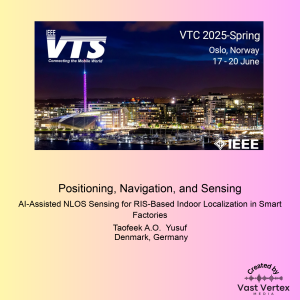

VTC 2025 Spring Conference’s Shorts
AI-Assisted NLOS Sensing for RIS-Based Indoor Localization in Smart Factories
2025-06-13
In the era of Industry 4.0, precise indoor localization is vital for automation and efficiency in smart factories. Reconfigurable Intelligent Surfaces (RIS) are emerging as key enablers in 6G networks for joint sensing and communication. However, RIS faces significant challenges in Non-Line-of-Sight (NLOS) and multipath propagation, particularly in localization scenarios, where detecting NLOS conditions is crucial for ensuring not only reliable results and increased connectivity but also smart...
In the era of Industry 4.0, precise indoor localization is vital for automation and efficiency in smart factories. Reconfigurable Intelligent Surfaces (RIS) are emerging as key enablers in 6G networks for joint sensing and communication. However, RIS faces significant challenges in Non-Line-of-Sight (NLOS) and multipath propagation, particularly in localization scenarios, where detecting NLOS conditions is crucial for ensuring not only reliable results and increased connectivity but also smart factory personnel’s safety. This study introduces an AI-assisted framework employing a Convolutional Neural Network (CNN) customized for accurate Line-of-Sight (LOS) and NLOS classification to enhance RIS-based localization using measured, synthetic, mixed-measured, and mixed-synthetic experimental data, that is, original, augmented, slightly noisy, and highly noisy data, respectively. Validated through such data from three different environments, the proposed customized-CNN (cCNN) model achieves 95.0%-99.0% accuracy, outperforming standard pre-trained models like Visual Geometry Group 16 (VGG-16) with an accuracy of 85.5%-88.0%. By addressing RIS limitations in NLOS scenarios, this framework offers scalable and high-precision localization solutions for 6G-enabled smart factories.
AI-Assisted NLOS Sensing for RIS-Based Indoor Localization in Smart Factories
Taofeek Yusuf, NEC Laboratories Europe in Germany, Aalborg University of Denmark; Sigurd S. Petersen, Aalborg University; Puchu Li, Aalborg University of Denmark; Jian Ren, Xidian University; Placido Mursia, NEC; Vincenzo Sciancalepore, NEC Laboratories Europe GmbH; Xavier Costa Pérez, NEC Laboratories Europe, i2cat Foundation and ICREA; Gilberto Berardinelli, Ming Shen, Aalborg University
View more
AI-Assisted NLOS Sensing for RIS-Based Indoor Localization in Smart Factories
Taofeek Yusuf, NEC Laboratories Europe in Germany, Aalborg University of Denmark; Sigurd S. Petersen, Aalborg University; Puchu Li, Aalborg University of Denmark; Jian Ren, Xidian University; Placido Mursia, NEC; Vincenzo Sciancalepore, NEC Laboratories Europe GmbH; Xavier Costa Pérez, NEC Laboratories Europe, i2cat Foundation and ICREA; Gilberto Berardinelli, Ming Shen, Aalborg University
Comments (3)


